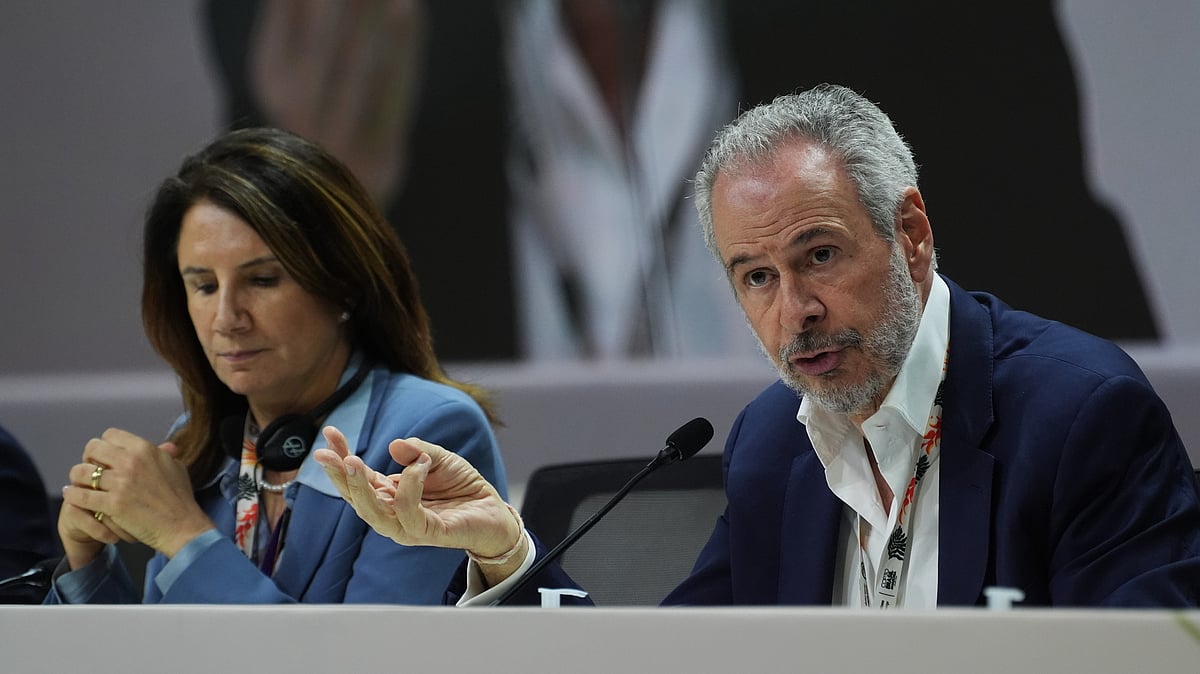At COP30, Two Verbal Promises Made: Ending Fossil Fuels and Saving Forests
As high-level drama unfolded, neither of the two 'roadmaps' made it to the final climate deal accepted at COP30.

advertisement
Whoever wagered on COP30 running overtime must be grinning right now. It’s a quirky tradition at the UN climate summits: observers and journalists place informal bets on when the final gavel will fall, signalling whether nearly 200 nations have managed to reach a consensus on a climate deal or not.
The climate talks were supposed to end Friday, 21 November. But, despite sleepless nights to produce a text amid high-level drama, the closing plenary—chaired by COP30 President André Corrêa do Lago— took place only on Saturday afternoon.
A fire broke out in the ‘Blue Zone’ of the COP30 venue, forcing a six‑hour closure.
(Photo: PTI)
On Saturday, the drama, which was mostly over including a 'roadmap' to phase out fossil fuels, seemed to have been resolved. Although the 'roadmap' didn't make it to the final text, or the Belém Political Package, COP30 President Lago made an oral commitment for two 'roadmaps'. In addition to ending fossil fuels, he said his presidency will commit to halting deforestation.
“They will be led by science, and they will be inclusive. With the spirit of the mutirão, we will convene high-level dialogues, gathering key international organisations, governments from both producing and consuming countries, in-the-street workers, scholars, civil society, and we will report back to the COP," he said.
Drama Over Fossil Fuel 'Roadmap'
On Thursday evening, speculation swirled that the closing plenary might wrap up the climate talks ahead of schedule. But those hopes were dashed when a fire broke out in the COP30 venue, halting negotiations from 2 pm to 8:40 pm local time in Brazil.
On Friday, rumours were again rife for the talks to be wrapped up. However, after Brazil dropped the draft for a proposed agreement early morning, things changed.
Soon after Brazil's proposal, the European Union (EU) and other emerging nations expressed their strong dissatisfaction at the draft not making any mention of "fossil fuels" or a "roadmap".
In a letter, 36 countries warned Brazil that they would reject any deal that did not include a plan to move away from oil, coal, and gas. "We cannot support an outcome that does not include a roadmap for implementing a just, orderly, and equitable transition away from fossil fuels," read the letter. Some of the signatories of the said letter had held a press conference at COP30 earlier in the week. Read more here.
Meanwhile, EU Climate Commissioner Wopke Hoekstra told reporters, "We're not going to hide the fact that we would have preferred to have more, to have more ambition on everything,"
Meanwhile, countries like oil-rich Saudi Arabia and Russia as well as India and other emerging countries came under fire for refusing language on a fossil-fuel phaseout.
Speaking to AFP, Arunabha Ghosh, a special envoy for South Asia at COP30, responded,
He further argued that developing countries needed to ensure energy security and a just transition for their workers dependent on fossil fuel sector.
COP30 President Lago, meanwhile, said those who doubt that cooperation is the best way forward for climate change "are going to be absolutely delighted to see that we cannot reach an agreement between us."
A Resolution at Last?
The 'roadmap' suspense stretched into Saturday until the COP30 President gaveled the closing plenary into motion. The resolution: An oral acknowledgement to phasing out fossil fuels following late-night negotiations with oil producers and emerging countries on Friday night.
“I know that most of you are tired, but as president of this conference, it’s my duty to recognise some very important discussions that took place in Belém, and that needs to continue during the Brazilian presidency until the next COP even if they are not reflected in the text we just approved," the COP30 president said.
“While far from what’s needed, the outcome is meaningful progress. The Paris Agreement is working, the transition away from fossil fuels agreed in Dubai is accelerating. Despite the efforts of major oil producing states to slow down the green transition, multilateralism continues to support the interests of the whole world in tackling the climate crisis,” Jennifer Morgan, former German climate envoy, said in a statement.
"Against the suffocating pressure of the fossil fuel industry and their lobbyists, the voices of the most vulnerable nations have prevailed through the announcement of a global roadmap to transition away from fossil fuels. At COP30, Colombia and over 80 nations showed courage by declaring the need to equitably phase out oil, gas, and coal," said Harjeet Singh, Climate Activist and Founding Director, Satat Sampada Climate Foundation.
“While the industry bought silence in the COP30 text, they cannot buy our silence in the streets. This roadmap, alongside the surging support for Colombia’s declaration, proves that while formal negotiations move at the speed of consensus, the world is ready to move at the speed of survival," he added.